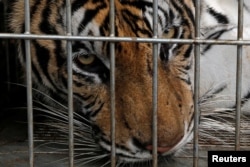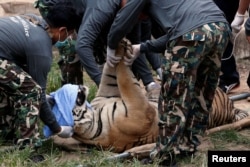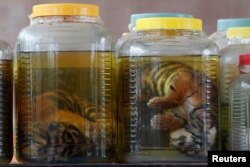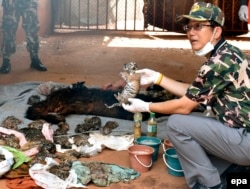Tougher law enforcement and regional cooperation to combat wildlife and timber trafficking is needed in South East Asia, says the U.N. Office on Drugs and Crime.
The call comes as Thailand steps up investigations on tiger farms, after a high profile raid uncovered tiger parts and trophies at a Buddhist temple in western Thailand.
Thailand has long grappled with a reputation as a key transit and destination point for trafficked wildlife from as far away as Africa to the poaching of its own Indochinese tigers.
In 2007 Thailand adopted the Convention on International Trade in Endangered Species on Wild Fauna and Flora, or CITES, resolution calling for an end to the intense breeding of tigers for commercial use.
But Edwin Wiek, founder of Wildlife Friends Foundation, says the tiger populations in farms and zoos have sharply increased from just 660 in 2007 to almost 1,500 tigers in 2016 in some 30 farms around Thailand.
“Thailand, just like Laos and Vietnam and China have basically not kept their promise” under the CITES agreement, says Wiek.
Tiger parts in high demand
Tiger bones and penises are in high demand in markets in Southern China and Vietnam to be used in traditional medicine. Bones are also made into pills and sold for up to $300 in the United States.
Renewed attention on the tiger farms and their potential dark side of trafficking to lucrative markets in China and Vietnam, followed raids on a famed "tiger Buddhist temple" or Wat Pa Luang Maha Bua, in western Kanchanaburi province in late May.
More than 140 tigers at been held at the temple grounds and zoo, of which 15 tigers and cubs were daily brought before tourists for contact and photo opportunities and interaction with visitors.
Disturbing discoveries
The scandal surrounding the temple erupted as Department of National Parks (DNP) officials were removing the tigers to new temporary holding centers, uncovered 60 frozen and bottled cub carcasses and pelts, a cache of other endangered species parts, together with tiger skins in the abbot’s private residence.
“The first images coming out of those dead cubs and the amount of them was absolutely shocking. Over 60 in total is a shocking amount,” Wiek said.
“But when you are inbreeding tigers, just breeding without responsibility, you are inbreeding generation after generation, you create an extremely weak specimen and a lot of those animals will not make it,” he said.
Other live tigers were found at a house 50 kilometers away in a fenced compound police alleged was used to hold the tigers before slaughtering them for their skins, meat and bones.
“It is very clear that there has been at least a small group of people involved in illegal wildlife trafficking from the temple. That is pretty clear, but it is not as bad as some people have said, where it’s like a whole syndicate or something. I don’t believe that,” Wiek said.
Also found were hundreds of talisman’s made from tiger parts, hornbills, tiger cub carcasses, skeletons, and stuffed bears.
Tanya Erzinlioglu, a volunteer and worker of six years at the tiger temple, said while she may have held suspicions, her main priority had been the welfare of the tigers under her care. But Erzinlioglu's fears were realized when three tigers disappeared in December 2014.
“Until the three tigers I never really saw anything untoward. Obviously once the three tigers suddenly disappeared then that suddenly changed everything because then there was concrete proof in what might have been going on, but I had not seen it,” she said.
The temple was a high profile tourist attraction, with estimated annual revenues at of more than $3 million a year.
Investigations are underway into the other zoos and tiger holding centers in Thailand. Wildlife protection groups say Thailand’s policy of licensing zoos, clearing them to breed tigers has helped to stimulate trafficking instead of curbing it.
Strong enforcement required
Jeremy Douglas, Asia representative for the U.N. Office on Drugs and Crime (UNODC) says to curb wildlife trafficking will require strong law enforcement. Analysts have often blamed lax law enforcement or corruption for the trafficking to thrive.
“The concern we’re most concentrated on is the disruption of the supply chain towards the markets,” Douglas told VOA.
“That’s really important that there’s a strong law enforcement and criminal justice response in place to identify this as a crime, investigate this as a crime, investigate the networks involved through the supply chain and ultimately disrupt supply that goes into markets,” he said.
Animal welfare groups have welcomed Thai Government moves to strengthen legal protection for all wildlife, including tougher penalties including a minimum jail term of four years for trafficking with greater direct involvement by non-government groups to assist in the care of confiscated wildlife.








